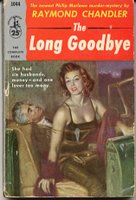 Had a fairly lousy session of limit two days ago. A better detective would’ve perceived the first hand as a clue of things to come. I get As Qd in the BB and watch as a player in middle position raises and the table folds around to me. I smooth call and the flop comes Qc 8h Jd. I check, my opponent bets, I raise, and he calls. Now I don’t know this gee from a horse’s caboose, but he does appear to have gotten the message of strength from my check-raise. The turn is a blank (2c). I bet and he timidly calls, making the pot 6.25 big bets. The river brings a dreaded king, so I check-call him to see I’ve been three-outed when he shows the friggin’ Kc Qh.
Had a fairly lousy session of limit two days ago. A better detective would’ve perceived the first hand as a clue of things to come. I get As Qd in the BB and watch as a player in middle position raises and the table folds around to me. I smooth call and the flop comes Qc 8h Jd. I check, my opponent bets, I raise, and he calls. Now I don’t know this gee from a horse’s caboose, but he does appear to have gotten the message of strength from my check-raise. The turn is a blank (2c). I bet and he timidly calls, making the pot 6.25 big bets. The river brings a dreaded king, so I check-call him to see I’ve been three-outed when he shows the friggin’ Kc Qh. So I begin by dropping 4 big bets to a cold deck. A couple of orbits later I get KK cracked for another decent-sized pot. (In fact, before I was done I’d be absurdly dealt kings four times, yet would only win once with them for an overall net of -9.25 BB on the four hands.) That I subsequently started to play some dicey starting hands out of position (ace-rag, two-gappers) only aggravated the situation further. We’ve all been there -- a bad beat or two and suddenly your otherwise-solid game takes a dive. Adding to the trouble is the fact that as your short stack becomes shorter, other players tend not to respect your raises (a factor contributing to my failures with King Kong, probably, as I was usually up against multiple opponents). (Incidentally, I’d argue this phenomenon to be as true in limit as it is in no-limit, despite the fact that theoretically it makes no difference in limit that your opponent has 30 more BB than you when the two of you are dueling for a pot -- as long as you have enough to play out the hand.) For all my misfortune, however, I definitely skilled my way to that losing session, realizing along the way that one of my biggest flaws is not knowing when to get away from a table that isn’t working for me.
Finding a new table online is laughably easy, so there’s no reason to stick around and play at a table where your image has evolved into that of a much lesser player. Yet there I’ll invariably stay, sometimes even as all of the players around the table have left and been replaced by new ones equally happy to receive my chips. It’s not even that I want to win my money back from the particular palookas that took it from me. Rather, it’s like I’m saying “Okay, Table 95987 (Real Money) . . . you took my twenty bucks and I’m gonna stay here ’til get every cent back if I have to play 65-offsuit UTG to do it . . . ! Okay, until I get half of it back . . . . All right then, until I land one nice pot. Fine, gimme one blind-steal for chrissake . . . .”
At the beginning of Raymond Chandler’s The Long Goodbye, Philip Marlowe talks about how he ends up getting involved with Terry Lennox against his own better judgment. “I’m supposed to be tough,” he says, “but there was something about the guy that got me.” From there proceeds his lengthy involvement with a case that in the end he knows he would have been better off avoiding altogether. Marlowe lets down his guard for a just a tic and before long finds himself in too deep.
It’s the opposite for me. “I’m supposed to be tough,” I tell myself, and thus refuse to say adios when I should. I need to develop a strategy here . . . perhaps some mechanical marker that tells me when I reach a certain point at a particular table that taking a hike is the right thing to do (and not an admission of less-than-manhood). In other words, some way to avoid the long goodbye. Suggestions will be most appreciated.
No comments:
Post a Comment